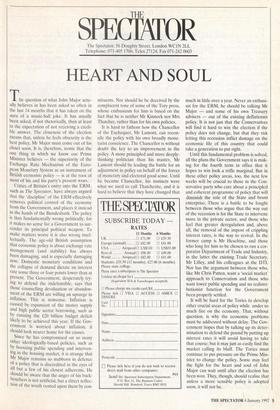SPECT r "AT OR The Spectator, 56 Doughty Street, London WC1N 2LL
Telephone: 071-405 1706; Telex 27124; Fax 071-242 0603
HEART AND SOUL
Critics of Britain's entry into the ERM, such as The Spectator, have always argued that the 'discipline' of the ERM effectively removes political control of the economy from the Government, and places it instead in the hands of the Bundesbank. The policy is thus fundamentally wrong politically, for it makes no sense for a Government to sur- render its principal political weapon. To make matters worse it is also wrong intel- lectually. The age-old British assumption that economic policy is about exchange rate management (and stability) has always been damaging, and is especially damaging now. Domestic monetary conditions and the collapse of demand dictate an interest rate some three or four points lower than at present. The Government, desperately try- ing to defend the indefensible, says that those counselling devaluation or abandon- ment of the ERM are willing an upsurge in inflation. This is nonsense. Inflation is caused by expansion of the money supply and high public sector borrowing, such as by running the £20 billion budget deficit likely to be achieved this year. If the Gov- ernment is worried about inflation, it should look nearer home for the causes.
Since he has compromised on so many other ideologically-based policies, such as by boosting public spending and interven- ing in the housing market, it is strange that Mr Major remains so stubborn in defence of a policy that is discredited in the eyes of all but a few of his closest adherents. He should be aware that the anger of his back- benchers is not artificial, but a direct reflec- tion of the wrath vented upon them by con- stitucnts. Nor should he be deceived by the complacent tone of some of the Tory press, whose enthusiasm for him is based on the fact that he is neither Mr Kinnock nor Mrs Thatcher, rather than for his own policies.
It is hard to fathom how the Chancellor of the Exchequer, Mr Lamont, can recon- cile the policy with his own broadly mone- tarist conscience. The Chancellor is without doubt the key to an improvement in the policy. A more principled and more deeply- thinking politician than his master, Mr Lamont should be leading the battle for an adjustment in policy on behalf of the forces of monetary and electoral good sense. Until he became Chancellor, his instincts were what we used to call Thatcherite, and it is hard to believe that they have changed tha much in little over a year. Never an enthusi- ast for the ERM, he should be talking Mr Major — and some of his own Treasury advisers — out of the existing deflationist policy. It is not just that the Conservatives will find it hard to win the election if the policy does not change, but that they risk letting this recession inflict damage on the economic life of this country that could take a generation to put right.
Until this fundamental problem is solved, all the plans the Government says it is mak- ing for the fourth term in office that it hopes to win look a trifle marginal. But in these other policy areas, too, the next few weeks will be crucial to those in the Con- servative party who care about a principled and coherent programme of policy that will diminish the role of the State and boost enterprise( There is a battle to be fought between those who argue that the way out of the recession is for the State to intervene more in the private sector, and those who feel that greater deregulation and, above all, the removal of the impost of crippling interest rates, is the way to revival. In the former camp is Mr Heseltine, and those who long for him to be chosen to run a cor- poratist Department of Trade and Industry, in the latter the existing Trade Secretary, Mr Lilley, and his colleagues at the DTI.
Nor has the argument between those who, like Mr Chris Patten, want a 'social market' approach to Conservatism and those who want lower public spending and no redistri- hutionist function for the Government been properly settled.
It will be hard for the Tories to develop other crucial areas of policy while under so much fire on the economy. That, without question, is why the economic problems must be addressed without delay. The Gov- ernment hopes that by talking up its deter- mination to defend the pound by putting up interest rates it will avoid having to take that course; but it may just as easily find the market calling its bluff. The Tories must continue to put pressure on the Prime Min- ister to change the policy. Some may feel the fight for the heart and soul of John Major can wait until after the election has been won. They, though, should realise that unless a more sensible policy is adopted soon, it will not be.










































 Previous page
Previous page